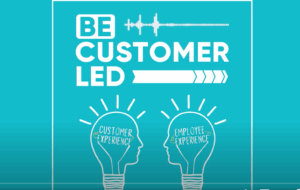

In this episode of (R)evolution, Nissan’s David Mingle, Director of Customer Management and Erich Marx, Director of Marketing join me for a refreshing conversation about social media’s impact on business transformation, customer experiences, and building an adaptive business model to learn and evolve based on new opportunities.
We explore Nissan’s approach to new media for not only marketing, but also how the company uses social media to invest in and shape the customer experience over time. Having both David and Erich on the show offered a 360 view of the customer and also demonstrates how organizations must rethink the customer journey before, during, and after transactions to ultimately define and lead it. I must say that I appreciate the honesty and full transparency in this discussion. It shows why Nissan is on the road to successful engagement.
At one point at about 1:54 in the discussion Erich Marx shares how the pact between leadership, customer management, and marketing at Nissan is creating a culture of exploration and innovation, “…understanding that we’re defining as we go what our ability is to play and play effectively in this space, a willingness to talk about what’s possible, a willingness to invest…to me, that’s leadership in the space right now…and, a trust that we will deliver ROI and value to the company.”
This episode was recorded during the Salesforce Social Advisory Board meeting in San Francisco. Participants included brand managers from the likes of Disney, Livingsocial, P&G, Nissan, SunTrust, Dunkin Donuts, Get Satisfaction, and VW, we address the need for businesses to not only react to conversations but also lead them.
Season Two:
S2E1: How Mercedes Benz Successfully Uses Social Media to Engage
S2E2: Technorati’s Richard Jalichandra on the State and Future of Social Media
S2E3: Guy Kawasaki on the Art of Enchantment
S2E4: Adly CEO Arnie Gullov-Singh on the Social Era of Celebrity Endorsements
S2E5: Filmmaker and Webby Awards Founder Tiffany Shlain
S2E6: Jim Louderback, Revision3 CEO on the Future of Broadcast and Web Television – Part 1 of 2
S2E7: Jim Louderback, Revision3 CEO on the Future of Broadcast and Web Television – Part 2 of 2
S2E8: Marcel LeBrun of Salesforce Radian6 on the Future of Social Media Monitoring
S2E9: Our Digital Society in the Next 30 Years: An Interview with John Battelle
S2E10: How Social Customer Service is Changing the Culture at Comcast
S2E11: Dunkin’ Donuts Uses Social Media to Improve Customer Relationships and Experiences
S2E12: USA Today’s Jon Swartz on Disruptive Technology’s Impact on Business and Culture
S2E13: Ford’s Jim Farley on the importance of putting your brand in the hands of customers
S2E14: How Suntrust Uses Social Media to Engage Customers and Comply with Regulation
Season One on YouTube
 Now on iTunes!
Now on iTunes!





“…not necessarily grilling me everyday as to what’s the ROI.”
As your guest alludes to here, there is a point at which the question of ROI crosses over from accountability to distraction.
We (marketers/agencies) often spend too much time with justification (understandably), and our reporting is focused on this, instead of optimization.
It needs to change on both sides of the equation, so that social can improve, not just be justified.
Well said Ian. Our work has to at least demonstrate a path toward alignment on business objectives and customer expectations.
This is all good and well Brian but at the grassroots level, Nissan is dropping the ball by alienating customers in the basic aspects of customer service. I’ve spent the better part of two years trying to get them to solve a problem since the day I purchased a Nissan vehicle. Even though they acknowledge the problem, they’ve been unable to determine the cause and their response is “Sorry, you’re on your own”.
Instead of trying to make the boat go faster perhaps they should just plug the leak.
Good to see some signs of synergy in a behemoth. It’s something that is usually sorely lacking.
In 2010, they had their toe in the pool, budget-wise and interest-wise. Companies should really pay more attention to the trends that exist among high school and college students–they’d be way ahead of the game.
I think it is a normal move for a company. Nowadays, everyone are most likely embracing the social media to improve ones’ customer’s experiences and foster advocacy. Failing to do that is failing to adapt. Which will make your company end up in crisis.